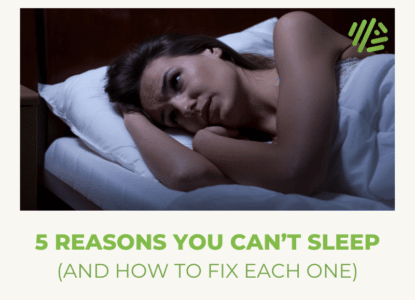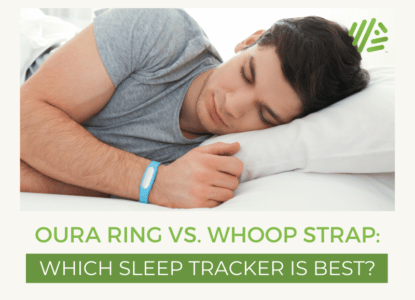Sleep Chronotypes: Why the Best Bed Time is Different for Each of Us
Article at a Glance
Emerging scientific research recognizes the validity of sleep chronotype, which is the science of our ideal bed time driven by genetics. Sleep scientist Matthew Walker has been a vocal proponent of following sleep chronotypes for optimal sleep.

Contents
- What Science has to say about the best bed time
- Do our chronotypes change over time?
- The 4 major chronotypes
- Your chronotype has a genetic component
- Different chronotypes are associated with certain personality traits
- Chronotypes and dietary habits
- Chronotypes and exercise timing
- Chronotype and Health Outcomes
- The bottom line
Our lives are organized according to an internal 24-hour biological clock, called a circadian rhythm. And while all of us go about our routines according to the day and night cycle, the timing of our own unique rhythm can vary from on person to the next. Some of us are early risers, others night owls, and as it turns out, the time we like to get up, or when we typically do our best work, is coded in our genes.
What Science has to say about the best bed time
Emerging scientific research recognizes the validity of sleep chronotype, which is the science of our ideal bed time. Sleep scientist Matthew Walker has been a vocal proponent of following sleep chronotypes for optimal sleep.
A sleep chronotype is your genetic propensity to sleep at a certain time of day and corresponds to your circadian rhythm. Natural variation exists amongst the human population, but generally, individuals are often separated into:
- Morning people (“larks”) who prefer going to bed and waking earlier
- Evening people (“owls”) who prefer a later bedtime and later rising time
- Intermediates (“hummingbirds”) who tend to stay in the middle
Interestingly, your chronotype also influences appetite, exercise, health, and core body temperature.
View a detailed rundown on the science behind chronotypes, here.
Do our chronotypes change over time?
Generally, most children have an early chronotype. Beginning in adolescence, the chronotype becomes later which has led to the assumption that teenagers are lazy because have difficulty waking up in the mornings, when in fact, it’s a change in their biological clock that is occurring.
Although it varies by individual, the chronotype then gradually starts to shift earlier beginning from the age of 20.
Most middle-aged American adults report a bedtime between 11 pm and 12 am, and a wake-up time between 7 am and 8 am.
The 4 major chronotypes
At Gene Food, we score customers into one of 3 chronotypes: larks, owls, and hummingbirds. The sleep doctor, Michael Breus, has broken down the chronotypes even further and claims that if you determine your chronotype, you’ll become more energetic and less tired during the day. He claims that if you experience fatigue and find it difficult to wake up in the morning, you probably don’t follow the daily schedule of your chronotype.
He divides the chronotypes into four main categories:
- Dolphins – light sleepers and tend to have trouble staying asleep at night. Their peak productivity hours are mid-morning to early afternoon.
- Lions – wake up early and have their peak productivity hours in the morning. They tend to get tired in the early evening.
- Bears – energy cycles that rise and fall with the sun and are most productive in the daytime, found in about 55% of the population.
- Wolves – stay up late and sleep late. They tend to start falling asleep when lions are starting to wake up. They make up approximately 15% of the population.
The first step in getting better quality sleep is to figure out what your chronotype is. You can do this by identifying your natural rise time as well as the time of day when you feel the most alert, or by using a genetic test.
Your chronotype has a genetic component
Research shows that chronotypes likely have a strong genetic component. Although multiple factors play a role, having a specific allele on the PER3 circadian clock gene has been tied to being a morning person.
It has been suggested that the reason there are variations in chronotype may date back to the hunter-gatherer era and served as a survival technique. The theory is that by taking turns sleeping, there would always be someone awake to keep watch around the clock.
Different chronotypes are associated with certain personality traits
Emerging evidence suggests that certain chronotypes possess personality traits that are dependent on whether you’re a morning or evening person.
This came to light in a study that found an association between the extraverted personality factor and the PER3 clock gene. This gene is a major regulator of your circadian rhythm and determines how long you sleep. Researchers took this a step further to determine whether there is in fact a link between chronotypes and personality characteristics.
In a study that assessed 2,492 individuals, extraversion, agreeableness, and conscientiousness were related to being an early riser, whereas being open to experiences and neuroticism were related to being a night owl.
Chronotypes and dietary habits
The association of chronotypes with other lifestyle factors has gained traction in recent years. Your chronotype may also affect your eating habits, such as how much coffee you consume.
In a study done in adolescents, the researchers found that later bed and rise times were associated with the tendency to drink caffeinated drinks, and eat fast food, but consume fewer dairy products. They concluded that morning-oriented pupils exhibit a healthier and more regimented lifestyle.
Chronotypes and exercise timing
Exercise has been prescribed as a non-pharmacological, low-cost treatment option for disturbed sleep. However, some researchers have raised concerns regarding the timing of exercise; finding that late-night exercise results in sleep-inhibiting conditions.
A study assessing 909 college students found that evening exercisers had later bedtimes, poorer sleep quality, and lower sleep efficiency compared to morning exercisers. They also reported greater daytime dysfunction compared to morning chronotypes.
So, if you’re an evening chronotype, it’s probably best to avoid exercising in the evening as this may worsen your functioning during the day.
Chronotype and Health Outcomes
The assessment of chronotype and its relation to overall health has gained attention since a growing body of evidence has highlighted the health hazards that are related to shift work, especially night shift work.
Health hazards have been more common among the “night owls” than among the “early birds,” such as:
- mood disorders
- anxiety disorder
- substance use disorders
- personality disorder
- insomnia
- arterial hypertension
- type 2 diabetes
- infertility
Alarmingly, current data suggest that “night owls” tend to die younger than “early birds”. These associations are so common that the routine assessment of chronotype as part of health status examinations in healthcare settings has been suggested in order to limit or curb the effect that possessing this chronotype has on overall health.
The bottom line
While the science behind chronotype is often confusing and complex, if you’re struggling to determine your chronotype, the best strategy is to keep a routine of waking up and going to sleep around the same time every evening. Remember that being a Wolf or a Dolphin isn’t the same as experiencing chronic insomnia and if you’re experiencing symptoms of insomnia, it’s a good idea to see a doctor and discuss potential external causes for your sleep problems.



